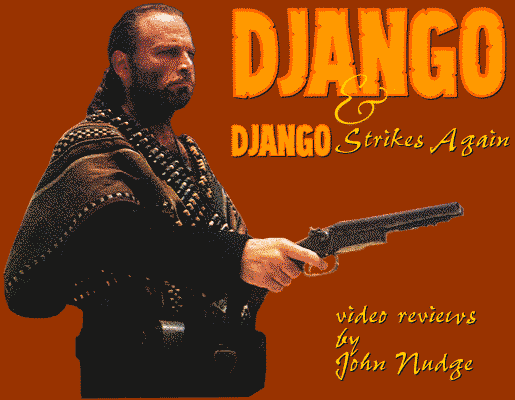 | VHS cover artwork for Django Strikes Again.
[click photo for larger version] |
DJANGO STRIKES AGAIN
Django Strikes Again is the only official sequel to Django, and it's the only one with Franco Nero in the lead role. Anchor Bay's widescreen transfer is of particular interest because it restores a 5½ minute prologue (featuring William Berger) that never made it to English-language editions.
Filmed in 1987, Django Strikes Again offers a drastically-reformed Django. He has given up his violent ways and become a monk. However, when his daughter is kidnapped by slavers, he digs up his infamous machine gun and racks up the body count once again.
Filmed on location in Columbia, but set in Mexico, Django Strikes Again has a strange, alien look to it. Palm trees and white sandy beaches might suggest southern coastal Mexico, but I couldn't help thinking this film belongs in the action/adventure category more than with the Westerns. (Critics frequently compare it with Rambo.) I also had a hard time with the lethargic pacing. I fell asleep in the middle because there seemed to be nothing important going on: Django goes here, Django goes there, etc., with no real direction. I was also bothered by Django's ability to spray a crowd with bullets and only hit the bad guys. A minor point, maybe, but irritating nonetheless.
While I applaud the effort to make a bonified Django sequel, the idea is certainly more intriguing than the execution. That's not to say there aren't some good moments. In one of the movie's best sequences, Django is in a cemetery, digging up his weapon, when a gang of bandits kills an undertaker and begins to assault the undertaker's wife. Django, unseen in the grave, tells them to let her go. Fragments of coffin explode from the hole as Django, dressed in his white monk's robe, rises with his machine gun and opens fire on the surprised men.
Christopher Connelly is tiresome as the megalomaniacal leader of the slavers. He is a dictator and self-styled king who uses innocent river boatmen for target practice (when he is not enslaving them to work in his silver mine). He is proud of the name the locals have given him -- Devil. Most of the other villains are cardboard characters -- laughing Mexican bandits who do Connelly's bidding, dimwit mine guards, and a woman who forsakes her morals for silver. One standout is Connelly's personal slave and concubine (Lucia Lee Lyon). She parades around wearing not much more than a set of fancy chains and treats her fellow slaves nearly as badly as her boss does. In one scene, the slaves (who are trapped in the riverboat's hold) ask for water. She pours a bucket over herself while the slaves struggle to drink the water that drips from her body.
Donald Pleasence has a nice turn as a slave who helps Django to escape after Django is captured by the slavers. Later, he has a good time throwing dynamite in the film's finale. He is one of the movie's few bright spots. However, most of the rest of the supporting cast give dull performances. Overall, Django Strikes Again represents a failed effort, an attempt at a sequel that did too many things wrong.

